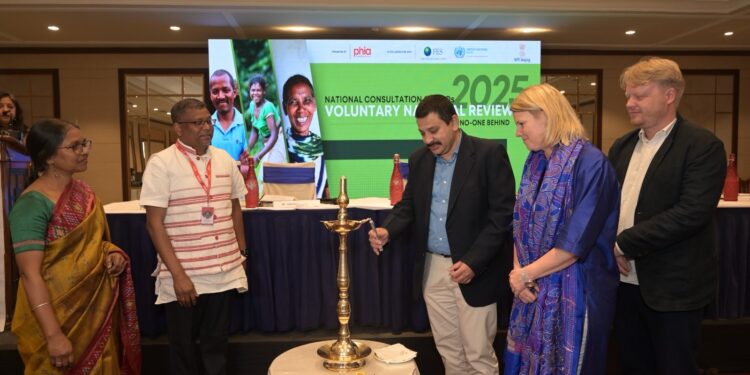Lagatar24 Desk
Ranchi: The National Consultation of Civil Society Organizations (CSOs) on Adivasis, organized by Partnering Hope Into Action Foundation (PHIA) and the Foundation for Ecological Security (FES) in collaboration with the United Nations Tribal Task Team, successfully concluded on February 18, 2025, at BNR Chanakya, Ranchi. The event was held under the aegis of NITI Aayog as part of India’s Voluntary National Review (VNR) 2025 process.
The VNR is a country-led initiative that evaluates national progress in implementing the Sustainable Development Goals (SDGs). The consultation saw participation from over 100 stakeholders, including CSOs, academic and research institutions, Adivasi leaders, scholars, subject matter experts, and policymakers. Discussions focused on key Adivasi-related issues, with recommendations to be submitted to NITI Aayog for integration into India’s VNR-2025 submission.
Key Discussions and Themes
The consultation was part of a broader initiative led by NITI Aayog to engage Leave No One Behind (LNOB) groups and ensure inclusive policy discussions. It followed a series of five regional online consultations held between February 3-15, 2025.
Key discussion themes included:
• Basic Amenities and Services – Education, health, housing, and infrastructure
• Natural Resource Rights – Forest rights, human-animal conflict, and environmental stewardship
• Livelihoods – Dignity, employment opportunities, migration, and displacement
• Culture and Traditional Knowledge – Recognition, preservation, and respect
• Policy and Governance – Representation, Schedule V & VI implementation, data frameworks
Voices from the Consultation
Several key figures attended the consultation, including representatives from UNDP, UNICEF, and NITI Aayog.
UNDP’s Isabelle Tschan highlighted the importance of monitoring SDG progress and emphasized the role of civil society and government collaboration in ensuring the success of social security schemes. She reiterated UNDP’s commitment to supporting such efforts.
Rajib Kumar Sen, Senior Advisor at NITI Aayog, described the VNR as a crucial process for assessing SDG indicators and determining actionable strategies for Adivasi communities.
PHIA Foundation’s Executive Director, Johnson Topno, expressed optimism that the consultation’s outcomes would significantly impact tribal development policies. He thanked all participants for their contributions in making the discussions meaningful.
UNICEF’s Dennis Christian Larsen linked indigenous development with child welfare, emphasizing the need to preserve Adivasi culture. He stressed that community-led efforts are crucial in ensuring children’s rights to health, education, and protection.
Commitment to Inclusive Development
The consultation reinforced the United Nations Tribal Working Group’s vision to integrate Adivasi perspectives into national development. Participants, including NITI Aayog representatives, CSOs, tribal experts, and UN agencies, collectively agreed to actively engage in solution-driven approaches for tribal rights, livelihoods, and sustainable development.







